How To Use Magnesium For Hair Growth | Risks & Side Effects
Take your hair health up a notch with the therapeutic properties of magnesium.
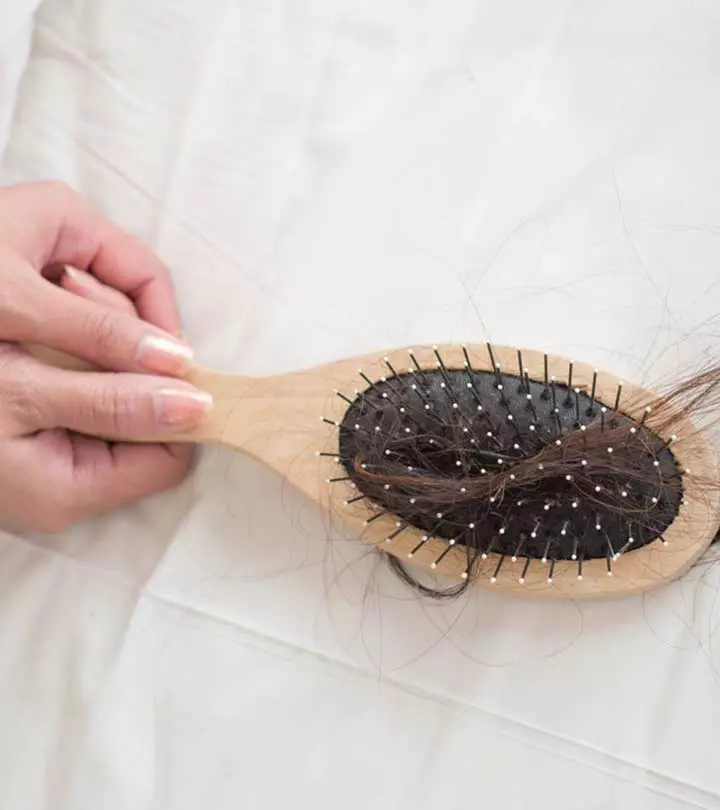
Image: ShutterStock
We can use magnesium for hair growth and maintaining hair health. Today, everyone faces common hair problems and is looking for an easy solution for growing long hair and hair loss prevention. Deficiency of vitamins and minerals in your hair could also lead to hair issues. However, you can get these by simple foot soak or hair massage. Wondering how? Epsom salt is the solution. It contains magnesium which can also endorse hair growth. This article discusses the role of magnesium in hair growth and ways to use it for getting healthy hair. Read on.
 Know Your Ingredient: Magnesium
Know Your Ingredient: MagnesiumWhat Is It?
An essential micronutrient that plays a key role in hair growth.
What Are Its Benefits?
It promotes follicle hair growth and helps in protein production and calcium regulation.
Who Can Use It?
People dealing with hair loss can use it upon discussion with their healthcare provider.
How Often?
For magnesium oil, you can try the remedy once or twice a week, and for Epsom salt baths, you can take one every week or every 2-3 days.
Caution
High doses of magnesium can cause nausea, diarrhea, and abdominal cramping.
In This Article
Magnesium And Hair Growth: Is There Any Link?
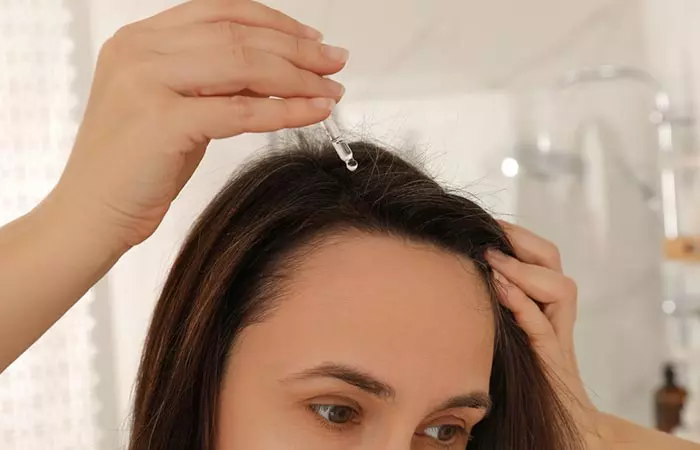
A study conducted in Germany found that magnesium can trigger the hair follicles, resulting in hair growth by more than 50%. The study found out that magnesium is absorbed by the body through the skin by spraying magnesium oil on the scalp and an Epsom salt foot soak (1). Though the sample size and the duration of the study were limited, the results prove that magnesium plays a role in hair growth.
Anecdotal evidence suggests that massaging magnesium oil into your scalp is invigorating. You may experience a pleasant tingling sensation that helps you destress and relax. Apart from combating stress (that can cause hair loss), this stimulation of follicles also boosts blood circulation, thus promoting hair growth. That is why it is widely believed that magnesium is beneficial for hair and scalp health.
Ensuring your diet includes essential nutrients for hair growth can further enhance your hair’s strength and vitality. At a cellular level, magnesium is one of the most important nutrients for healthy hair growth. It is an essential cofactor for more than 300 enzymes that regulate multiple biochemical processes (2).
Magnesium is also an essential trace metal that is involved in numerous metabolic functions in the body such as protein synthesis, calcium regulation, and activation of vitamin D (3), (3). Both calcium and vitamin D play an important role in the development of hair follicles (4). Thus, it is involved in the overall growth of your hair.
When considering it for hair loss, it is essential to choose the right type of magnesium. Check out the best forms of magnesium for hair health in the section below.
Key Takeaways
- Magnesium may stimulate hair growth by activating the hair follicles.
- A magnesium deficiency can cause hair loss due to mineral imbalance.
- You can apply magnesium oil to your scalp, place your feet in an Epsom salt soak, or consume oral magnesium supplements.
- Topical magnesium may cause irritation and a burning sensation in some people.
What Type Of Magnesium Is Best For Hair Loss?
- Magnesium Citrate:It is readily absorbed by the body and enhances nutrient delivery to the hair follicles to support hair growth.
- Magnesium Glycinate:This form is gentle on the stomach and may help reduce stress, which may be the cause of your hair loss.
- Magnesium Threonate:It may help manage stress and improve overall health due to its ability to cross the blood-brain barrier, potentially benefiting hair growth.
Note:
This information is rooted in anecdotal evidence, as there is limited substantial scientific research in this particular area. Please consult a doctor before purchasing any magnesium to use on your hair.
So, we have learned how magnesium helps promote hair growth. But, what happens when you face nutrient deficiency? Find out below.
Magnesium Deficiency And Hair Loss
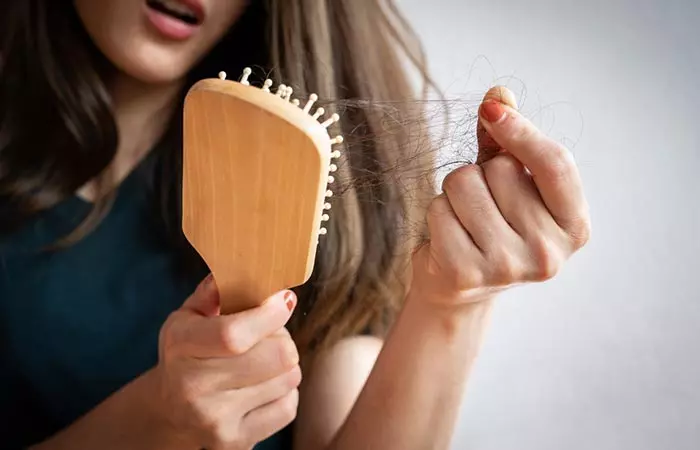
Incorporating specific foods for hair growth into your meals is another effective way to nourish your hair from within. The role of magnesium deficiency in causing hair loss is indirect (5). Since magnesium is involved in multiple metabolic processes, a lack of magnesium can disrupt the mineral homeostasis (mineral balance) (2). This can lead to impaired protein synthesis which, in turn, can trigger hair loss. So, it is recommended to consume magnesium-rich foods such as pumpkin seeds, spinach, almonds, avocado, and rice. (2).
The recommended daily intake of magnesium for adult men and women is 400 mg and 310 mg, respectively (2). This can be met by following a well-balanced diet. You can also get the benefits of magnesium through topical application as it can be absorbed by the skin. Thus, you can massage your scalp with magnesium oil to fight hair loss (1). Magnesium oil is made from a mixture of magnesium chloride flakes and water. You can learn how to prepare it at home.
Lifestyle habits can impact your body’s magnesium levels, which play a key role in overall health, including hair growth. By making a few changes to your daily routine, you can help your body maintain healthy magnesium levels.
Lifestyle Factors Influencing Magnesium Levels
Here are some lifestyle factors that can affect your magnesium levels (6), (7), (8), (9):
- High-stress levels can significantly deplete magnesium in the body. Chronic stress leads to increased magnesium consumption, making effective stress management crucial for maintaining healthy magnesium levels. This advice underlines the importance of managing stress effectively for overall health and well-being.
- A diet low in magnesium-rich foods can lead to numerous deficiencies. Foods like leafy greens, nuts, and whole grains can help you maintain healthy magnesium levels.
- Too much alcohol may deplete magnesium. It can increase magnesium loss through urine, so moderation is key.
- Regular exercise helps the body absorb magnesium better.
- Smoking can interfere with magnesium absorption. It can lower magnesium uptake, making it harder to maintain levels stable.
We have established that magnesium is important for hair growth. Additionally, understanding how to stimulate hair growth naturally can complement your efforts to maintain a full and healthy mane. Find out in the next section how to use it effectively.
How To Use Magnesium to Promote Hair Growth
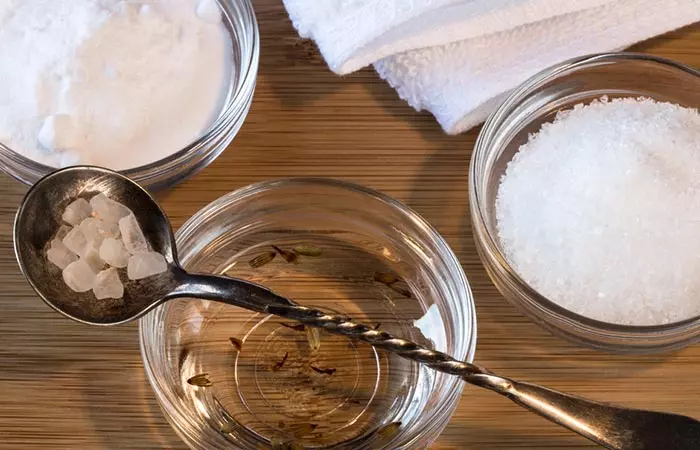
1. Magnesium Oil For Hair Loss
You Will Need
- 10-15 drops of magnesium oil
- Water
Process
- Take 10-15 drops of magnesium oil and dilute it in water.
- Gently massage this mixture into your scalp. Use your fingertips to boost blood circulation.
- Wash off the oil with water and shampoo.
- Do not keep it on for longer than 30 minutes as it can dry out your hair.
If you notice any itchiness or irritation, wash off the oil immediately and consult a medical practitioner.
Eetiei, a YouTuber, spoke about using magnesium oil for hair growth for two months. She said, “It started to help my hair to grow. I spray it before I go to bed. You can see my edges coming out. My baby hair coming out (i).”
 Quick Tip
Quick Tip2. Epsom Salt Soak
You Will Need
- 2 cups of Epsom salt
- Water (for a bath)
Process
- Add the 2 cups of Epsom salt to lukewarm water in the bathtub.
- Mix the bath water to dissolve all the salts.
- Soak in the bath for 15 minutes.
- Rinse off or take a shower.
Apply a moisturizer to replenish the lost moisture of your skin.
The magnesium in the bath water is absorbed by your skin and, thus, may help boost hair growth.
3. Magnesium Pill Or Oral Supplements

You can take oral supplements of magnesium as prescribed by a doctor to fight hair loss.
 Quick Tip
Quick TipThus, magnesium can be used in multiple ways to boost hair growth. But, how safe is it? Scroll down to find out about its side effects.
Risks And Side Effects

It is important not to cross the recommended dietary levels of magnesium. Long-term use of magnesium supplements without proper guidance can cause unwanted side effects. It’s always a good idea to talk to a healthcare professional before starting any new supplements to ensure you are using them safely and at the right dosage.
In the case of topical application of magnesium oil, do a small patch test on your forearm to check if you are allergic to it before applying it to your scalp. Some people may experience irritation, stinging, or a burning sensation. Stop using it immediately if this occurs.
Do not take magnesium oil orally. Ingestion of magnesium oil may cause adverse effects such as nausea and diarrhea (2). Consult a licensed dietitian or a dermatologist if you notice excessive hair loss even after these fixes.
Infographic: Magnesium-Rich Foods And Recommended Intake
Magnesium is an essential trace mineral responsible for multiple bodily functions. However, its deficiency can be detrimental to our health and can even lead to hair loss. While there are many ways to improve magnesium levels in the body, one of the easiest and healthiest ways is to eat foods rich in magnesium. The following infographic lists such foods and discusses the recommended dietary intake of this mineral. Take a peek!
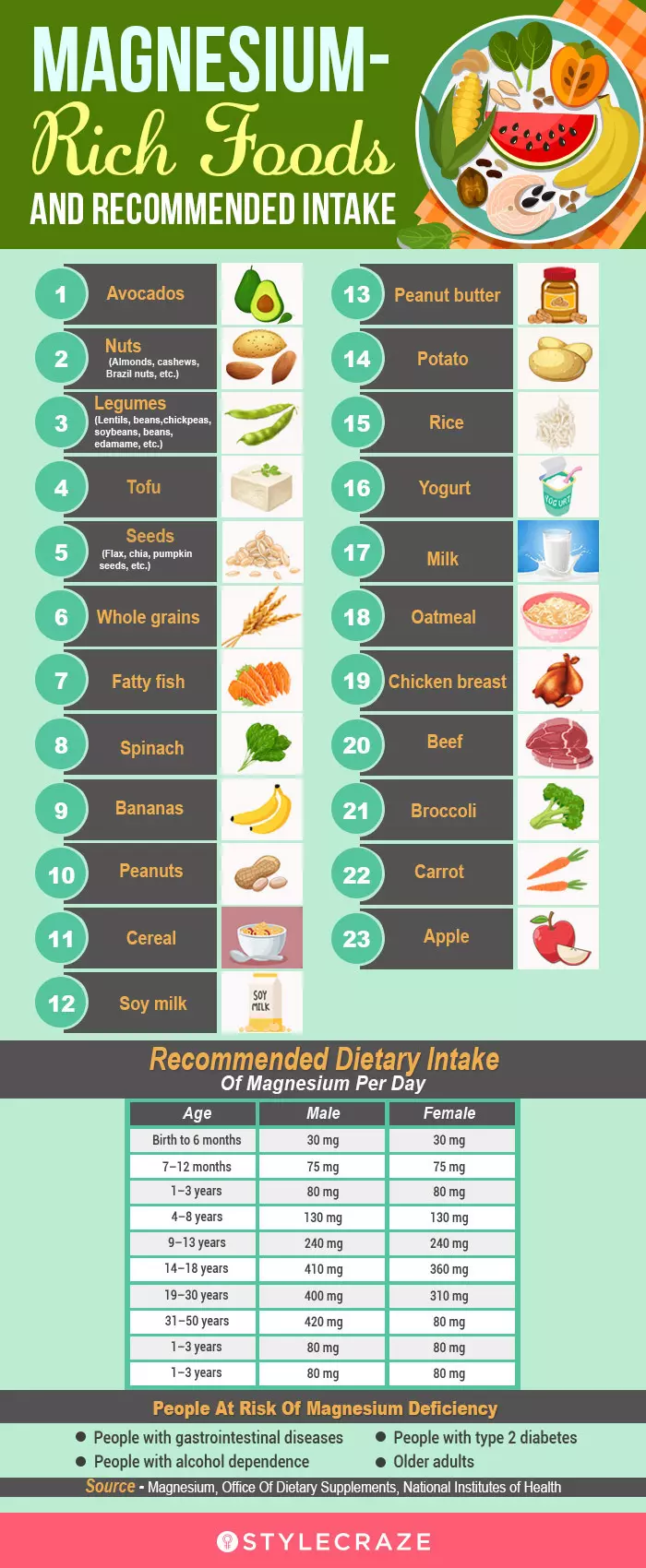
Illustration: StyleCraze Design Team
Magnesium plays an important role in hair growth. It is an important nutrient for hair care and may promote hair growth by 50%. You can use magnesium for hair growth in various ways. For example, massaging magnesium oil and consuming magnesium-rich food stimulate hair follicles, boost blood circulation, and improve hair growth. You can prepare a magnesium bath or take magnesium supplements to reap its benefits. However, do not take magnesium oil orally as it may cause adverse effects. Consult your doctor to determine the dosage of oral pills and supplements.
Frequently Asked Questions
Does magnesium help with baldness?
Baldness caused by hair loss due to a magnesium deficiency can be reduced with magnesium supplementation.
What are the benefits of taking magnesium daily?
Magnesium helps with many body functions like muscle and nerve activation, blood pressure and blood sugar management, and improvement in bone and heart health.
Can magnesium reverse gray hair?
If the cause of your graying hair is a magnesium deficiency, then taking magnesium supplements can reverse it.
Does magnesium block DHT?
Magnesium may help prevent hair loss caused by DHT. Increased hormone levels may cause hair loss by reducing mineral supply to the follicles, which may be combated with mineral supplementation.
Discover the connection between magnesium and hair regrowth in this insightful video. Unlock the secrets to healthy, luscious hair. Watch now and nourish your strands from within.
Personal Experience: Source
StyleCraze's articles are interwoven with authentic personal narratives that provide depth and resonance to our content. Below are the sources of the personal accounts referenced in this article.
(i). Magnesium oil helped with my hair growthhttps://www.youtube.com/watch?v=htq6P-n48HI
References
Articles on StyleCraze are backed by verified information from peer-reviewed and academic research papers, reputed organizations, research institutions, and medical associations to ensure accuracy and relevance. Read our editorial policy to learn more.
- Myth or RealityTransdermal Magnesium?
https://www.ncbi.nlm.nih.gov/pmc/articles/PMC5579607/ - Magnesium
https://ods.od.nih.gov/factsheets/Magnesium-HealthProfessional/ - Role of Magnesium in Vitamin D Activation and Function
http://cardiacos.net/wp-content/uploads/ArticulosMedicos/20180722/2018—Role-of-Magnesium-in-Vitamin-D-Activation-and-Function.pdf - The Transient Role for Calcium and Vitamin D during the Developmental Hair Follicle Cycle
https://www.sciencedirect.com/science/article/pii/S0022202X16308764 - Nutrition of women with hair loss problem during the period of menopause
https://www.ncbi.nlm.nih.gov/pmc/articles/PMC4828511/ - [Magnesium deficiency and stress: Issues of their relationship, diagnostic tests, and approaches to therapy]
https://pubmed.ncbi.nlm.nih.gov/26591563/ - Dietary recommendations of magnesium for cardiovascular prevention and treatment. A position paper of the Israel Heart Society and the Israel Dietetic Association
https://pubmed.ncbi.nlm.nih.gov/34519647/ - Magnesium deficiency and alcohol intake: mechanisms, clinical significance and possible relation to cancer development (a review)
https://pubmed.ncbi.nlm.nih.gov/7836619/ - Inverse Correlation between Serum C-Reactive Protein and Magnesium Levels in Smokers and Nonsmokers
https://pmc.ncbi.nlm.nih.gov/articles/PMC4488994/
Read full bio of Dr. Shruti Chavan
Read full bio of Annie Jangam
Read full bio of Eshna Das
Read full bio of Monomita Chakraborty






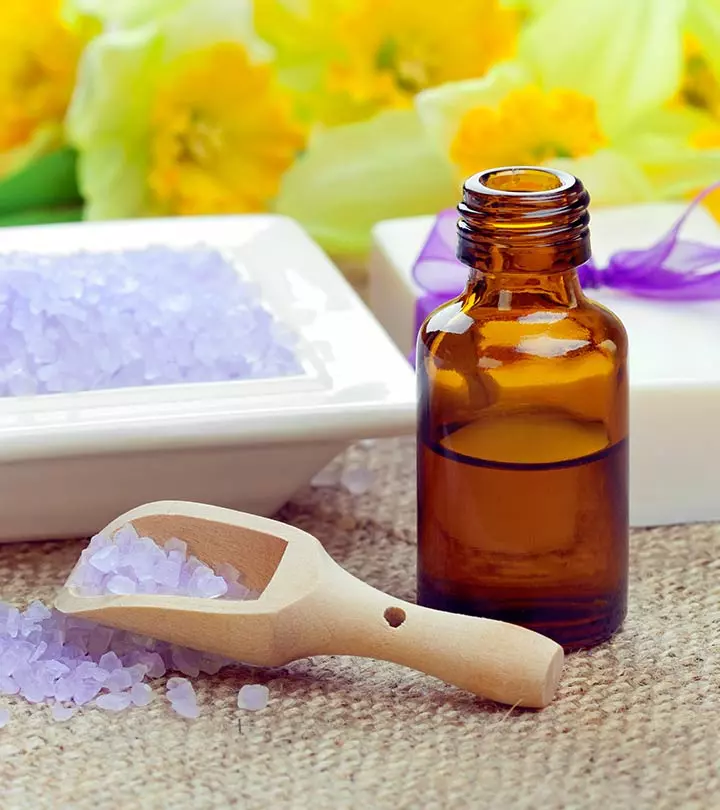
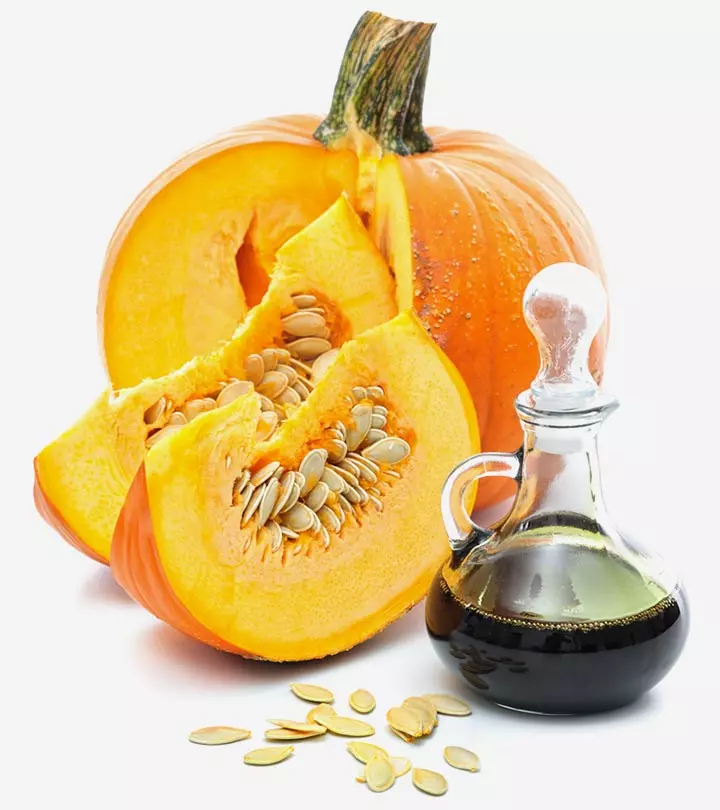
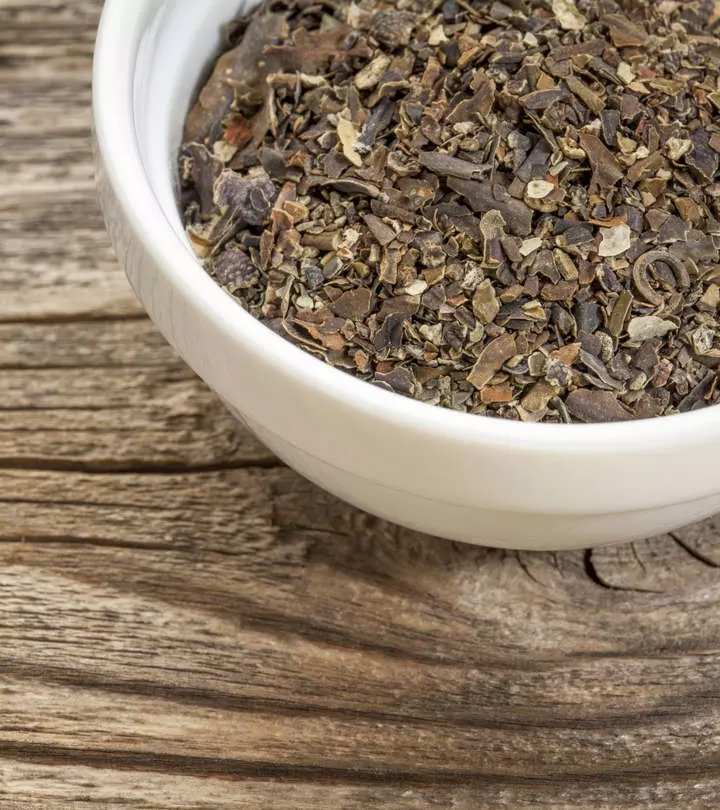
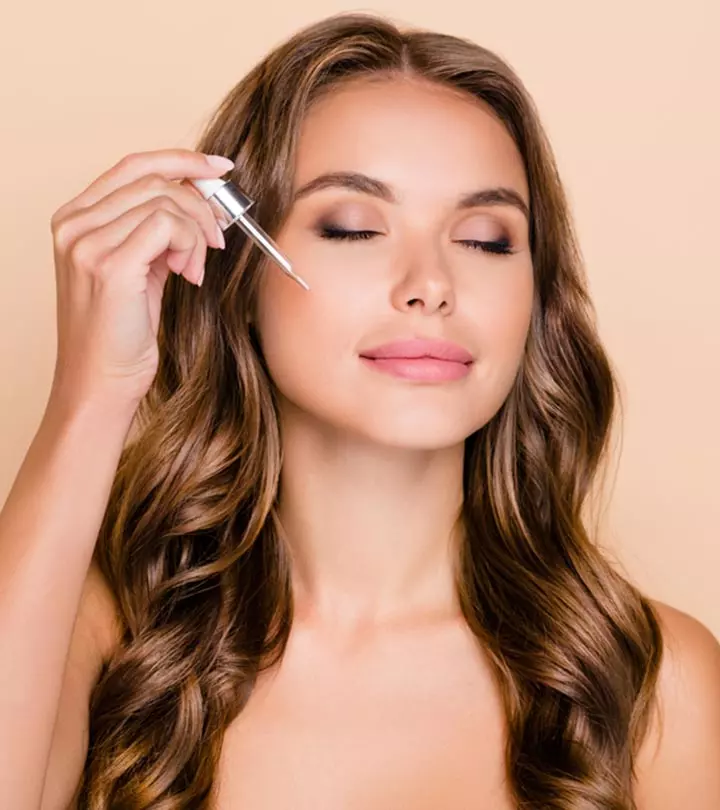
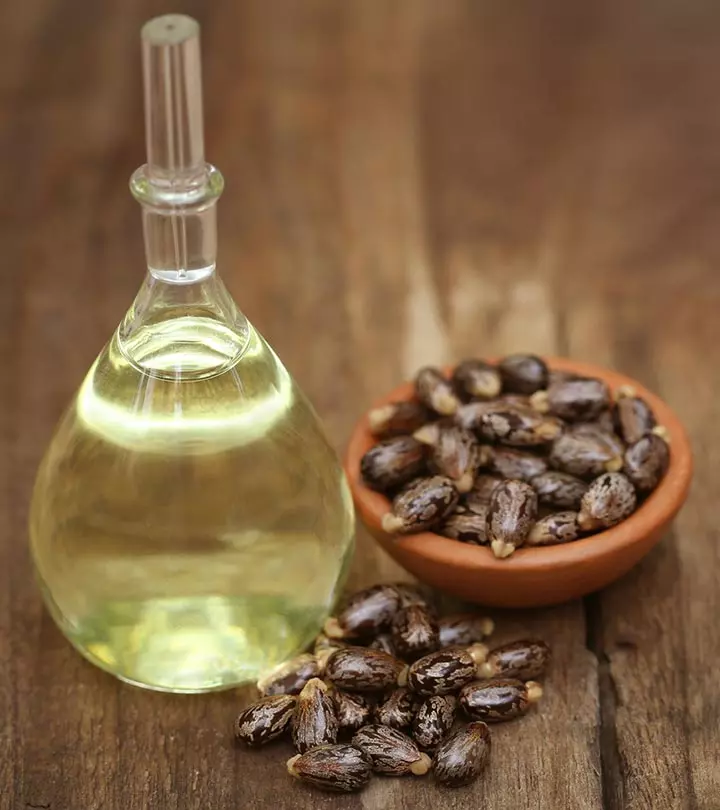

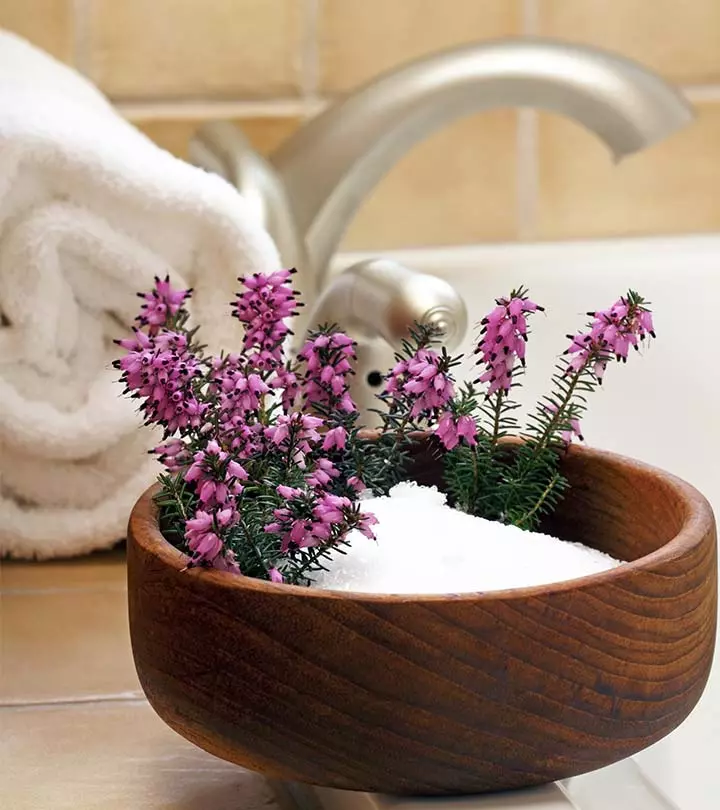
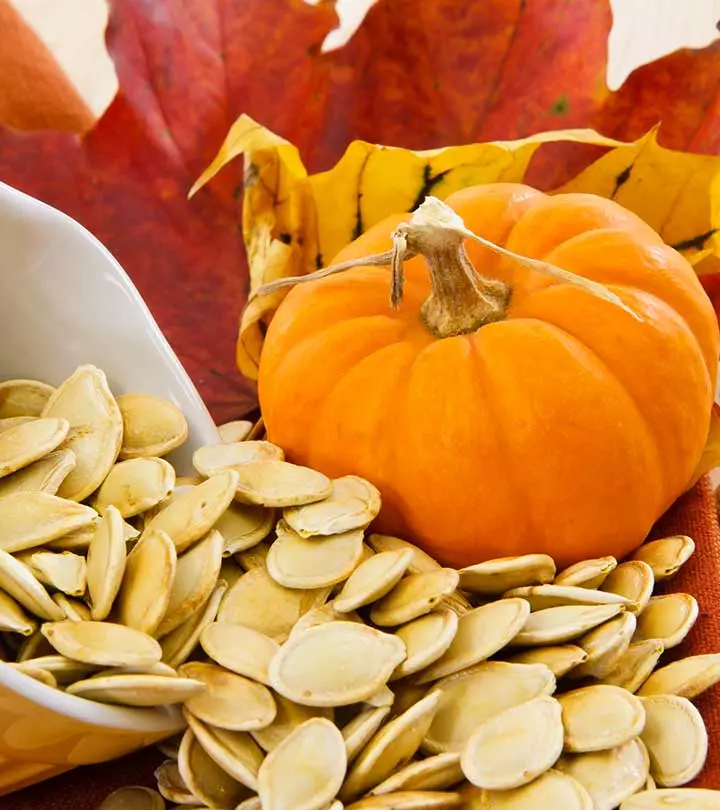



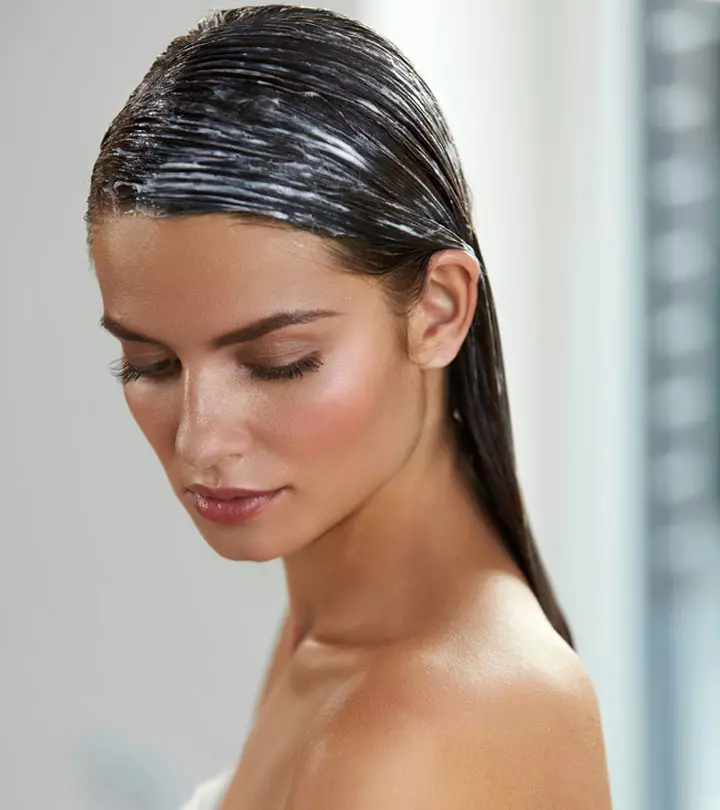

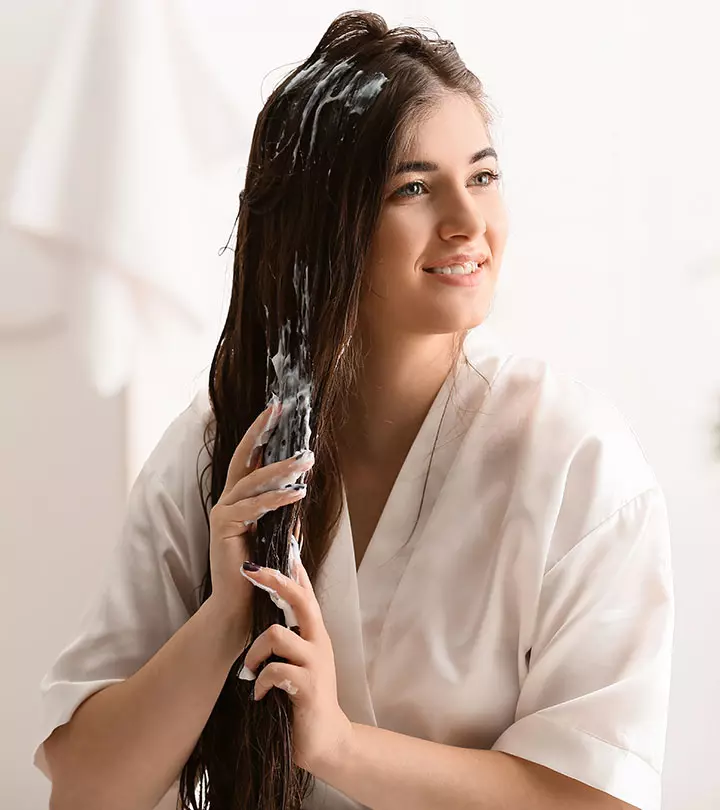
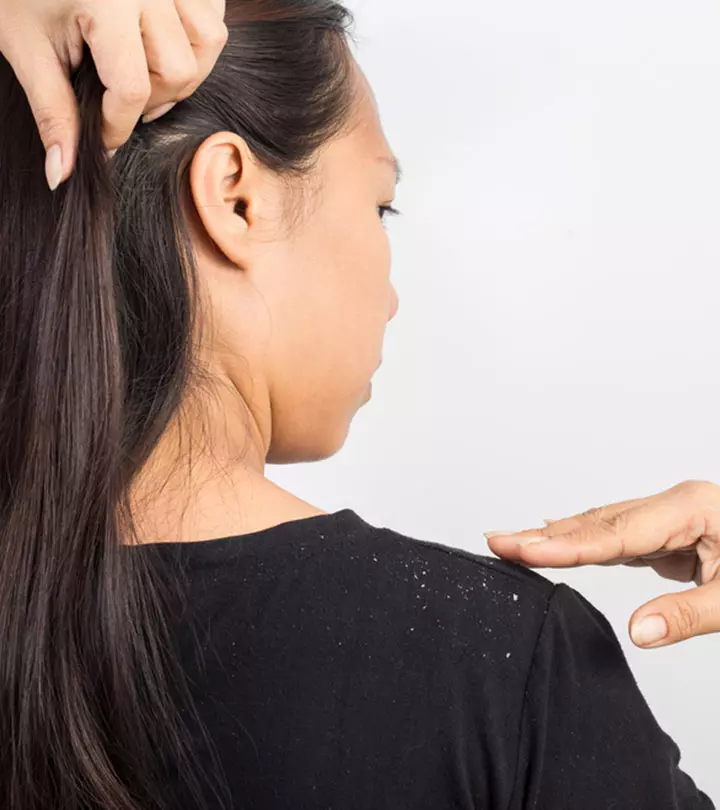


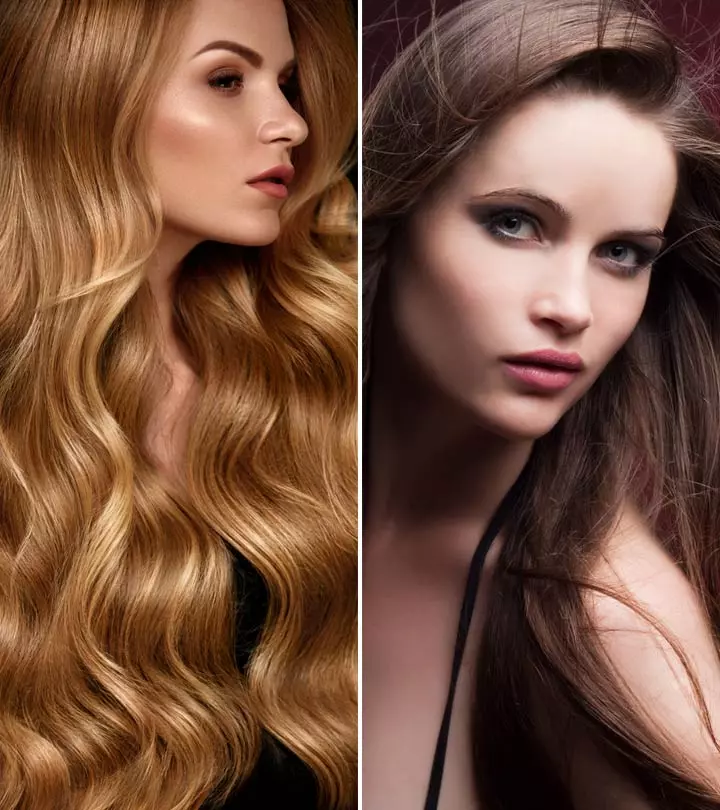
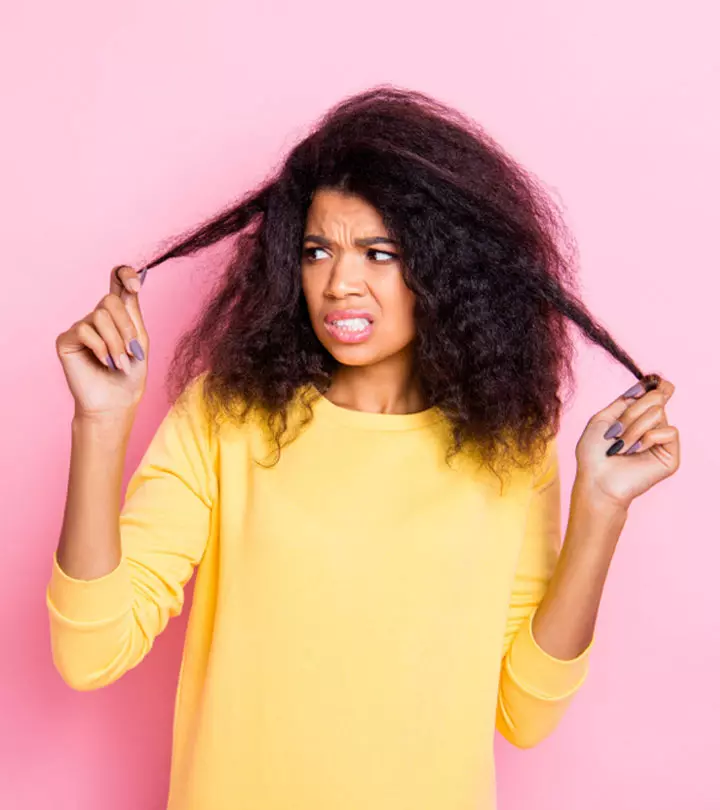
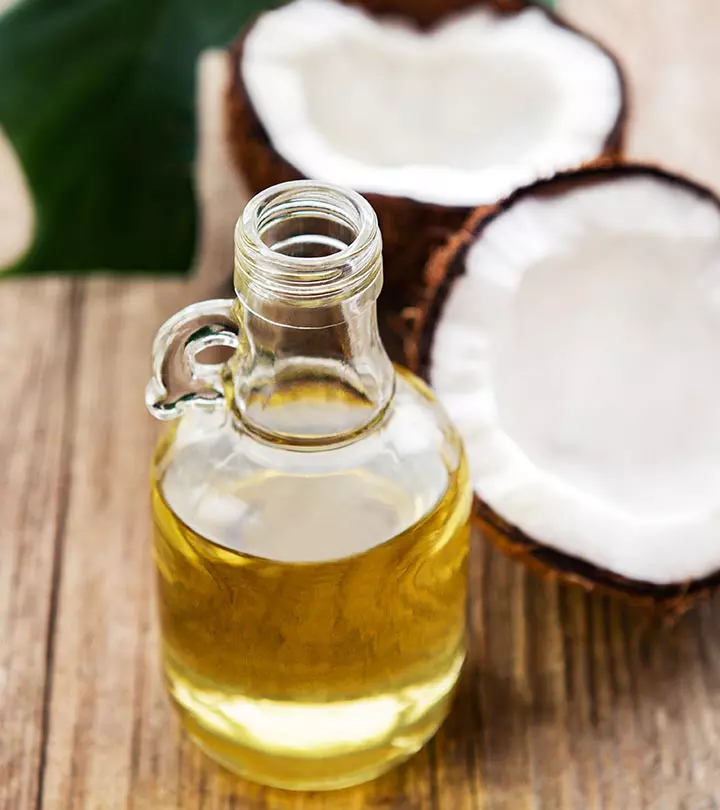
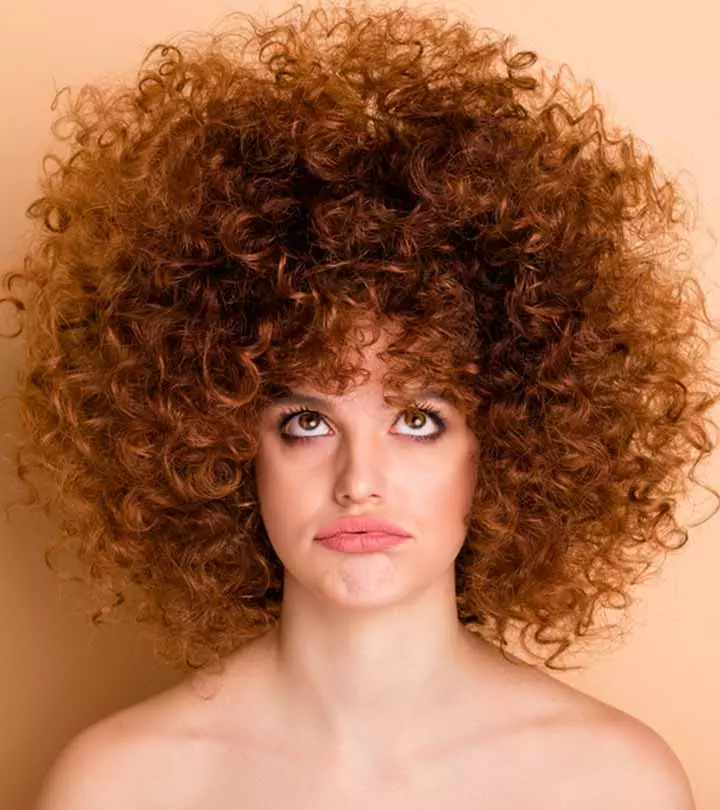
Community Experiences
Join the conversation and become a part of our empowering community! Share your stories, experiences, and insights to connect with other beauty, lifestyle, and health enthusiasts.